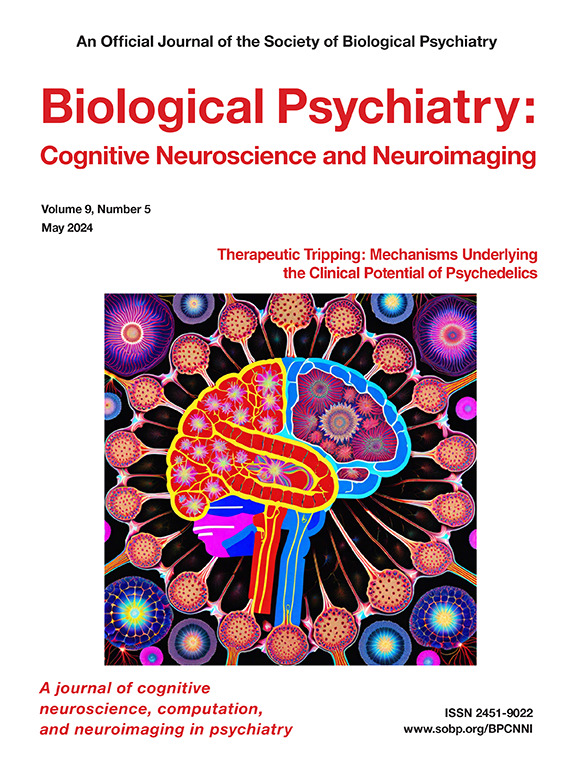Psilocybin and 2C-B at Encoding Distort Episodic Familiarity
IF 4.8
2区 医学
Q1 NEUROSCIENCES
Biological Psychiatry-Cognitive Neuroscience and Neuroimaging
Pub Date : 2024-10-01
DOI:10.1016/j.bpsc.2024.06.008
引用次数: 0
Abstract
Background
As research on psychedelics (hallucinogenic serotonin receptor 2A agonists) progresses, it is important to delineate the reliability of supposedly unique effects across this drug class. One such effect is how psychedelics impair the formation (i.e., encoding) of hippocampal-dependent recollections (retrieval of specific details) while potentially enhancing the encoding of cortical-dependent familiarity (a feeling of knowing that a stimulus has been previously experienced).
Methods
In a double-blind, placebo-controlled, within-participants study (N = 20), we tested the acute effects of 2 distinct psychedelics, psilocybin and 2C-B, on the encoding of emotional episodic memories. During acute drug effects, participants viewed negative, neutral, and positive pictures. The following day (while sober), participants completed 2 separate memory tests for these pictures.
Results
Using computational models of memory confidence, we found trends for psilocybin and 2C-B at encoding to impair estimates of recollection that were supported by other measures/analyses. Surprisingly, psilocybin and 2C-B at encoding impaired estimates of familiarity, but these impairments were likely due to a misattribution of heightened familiarity, because both drugs at encoding selectively increased familiarity-based false alarms, especially for negative and positive stimuli. Psilocybin and 2C-B at encoding also tended to impair estimates of metamemory (understanding one’s own memory) for negative and neutral memories but enhanced estimates of metamemory for positive memories, although these effects were less reliable in additional analyses.
Conclusions
Despite differences in their chemistry, pharmacology, and subjective effects, both psilocybin and 2C-B distorted episodic familiarity, suggesting a common neurocognitive mechanism across psychedelics that may drive other phenomena.
在编码时,迷幻药和 4-溴-2,5-二甲氧基苯乙胺(2C-B)会扭曲外显熟悉性。
背景:随着对迷幻药(致幻5-HT2A激动剂)研究的深入,有必要对这类药物的所谓独特效应的可靠性进行界定。其中一种效应是迷幻药如何损害海马依赖性回忆(特定细节的检索)的形成(即编码),同时又有可能增强大脑皮层依赖性熟悉感(一种知道以前经历过某种刺激的感觉)的编码:在一项双盲、安慰剂对照、被试内研究(N = 20)中,我们测试了两种不同的迷幻剂--迷幻素和4-溴-2,5-二甲氧基苯乙胺(2C-B)--对情绪外显记忆编码的急性影响。在急性药效期间,受试者观看了负面、中性和正面图片。第二天(清醒时),参与者分别完成了对这些图片的记忆测试:利用记忆信心的计算模型,我们发现在编码时,迷幻药和 2C-B 有损害回忆估计值的趋势,而其他测量/分析也支持这种趋势。令人惊讶的是,在编码时使用迷幻药和 2C-B 会损害对熟悉程度的估计,但这些损害可能是由于对熟悉程度提高的错误归因造成的,因为这两种药物在编码时都会选择性地增加基于熟悉程度的错误警报,尤其是对负面和正面刺激的错误警报。在编码时,迷幻药和2C-B还倾向于损害对负面和中性记忆的元记忆(理解自己的记忆)的估计,但会增强对正面记忆的元记忆的估计,尽管这些效应在其他分析中不那么可靠:结论:尽管迷幻药的化学成分、药理作用和主观效应各不相同,但它们都会扭曲表观熟悉性,这表明迷幻药具有一种共同的神经认知机制,这种机制可能会驱动其他现象。
本文章由计算机程序翻译,如有差异,请以英文原文为准。
求助全文
约1分钟内获得全文
求助全文
来源期刊

Biological Psychiatry-Cognitive Neuroscience and Neuroimaging
Neuroscience-Biological Psychiatry
CiteScore
10.40
自引率
1.70%
发文量
247
审稿时长
30 days
期刊介绍:
Biological Psychiatry: Cognitive Neuroscience and Neuroimaging is an official journal of the Society for Biological Psychiatry, whose purpose is to promote excellence in scientific research and education in fields that investigate the nature, causes, mechanisms, and treatments of disorders of thought, emotion, or behavior. In accord with this mission, this peer-reviewed, rapid-publication, international journal focuses on studies using the tools and constructs of cognitive neuroscience, including the full range of non-invasive neuroimaging and human extra- and intracranial physiological recording methodologies. It publishes both basic and clinical studies, including those that incorporate genetic data, pharmacological challenges, and computational modeling approaches. The journal publishes novel results of original research which represent an important new lead or significant impact on the field. Reviews and commentaries that focus on topics of current research and interest are also encouraged.
 求助内容:
求助内容: 应助结果提醒方式:
应助结果提醒方式:


